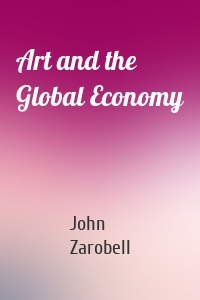Социология
5875 кн.
Art and the Global Economy
Art and the Global Economy analyzes major changes in the global art world that have emerged in the last twenty years including structural shifts in the global art market; the proliferation of international art fairs, biennials and blockbuster exhibitions; and the internationalization of the scope of contemporary art. John Zarobell explores the economic and social transformations in the cultural sphere, the results of greater access to information about art, exhibitions, and markets around the...
| Автор | John Zarobell |
Making Los Angeles Home
Making Los Angeles Home examines the different integration strategies implemented by Mexican immigrants in the Los Angeles region. Relying on statistical data and ethnographic information, the authors analyze four different dimensions of the immigrant integration process (economic, social, cultural, and political) and show that there is no single path for its achievement, but instead an array of strategies that yield different results. However, their analysis also shows that immigrants'...
| Автор | Rafael Alarcon |
The Para-State
Since its independence in the nineteenth century, the South American state of Colombia has been shaped by decades of bloody political violence. In <I>The Para-State,</I> Aldo Civico draws on interviews with paramilitary death squads and drug lords to provide a cultural interpretation of the country’s history of violence and state control. Between 2003 and 2008, Civico gained unprecedented access to some of Colombia’s most notorious leaders of the death...
| Автор | Aldo Civico |
Love's Uncertainty
Love’s Uncertainty explores the hopes and anxieties of urban, middle-class parents in contemporary China. Combining long-term ethnographic research with analyses of popular child-rearing manuals, television dramas, and government documents, Teresa Kuan bears witness to the dilemmas of ordinary Chinese parents, who struggle to reconcile new definitions of good parenting with the reality of limited resources. Situating these parents’ experiences in the historical context of state efforts to...
| Автор | Teresa Kuan |
Regression Models for Categorical,...
Social science and behavioral science students and researchers are often confronted with data that are categorical, count a phenomenon, or have been collected over time. Sociologists examining the likelihood of interracial marriage, political scientists studying voting behavior, criminologists counting the number of offenses people commit, health scientists studying the number of suicides across neighborhoods, and psychologists modeling mental health treatment success are all interested in...
| Автор | Dr. John P. Hoffmann |
The Student Loan Mess
This illuminating investigation uncovers the full dimensions of the student loan disaster. A father and son team—one a best-selling sociologist, the other a former banker and current quantitative researcher—probes how we’ve reached the point at which student loan debt—now exceeding $1 trillion and predicted to reach $2 trillion by 2020—threatens to become the sequel to the mortgage meltdown. In spite of their good intentions, Americans have allowed concerns about deadbeat students, crushing...
| Автор | Joel Best |
The Self-Help Myth
Can philanthropy alleviate inequality? Do antipoverty programs work on the ground? In this eye-opening analysis, Erica Kohl-Arenas bores deeply into how these issues play out in California’s Central Valley, which is one of the wealthiest agricultural production regions in the world and also home to the poorest people in the United States.<BR /><BR /> Through the lens of a provocative set of case studies, <I>The Self-Help Myth</I> reveals how philanthropy...
| Автор | Erica Kohl-Arenas |
More Than Just Food
The industrial food system has created a crisis in the United States that is characterized by abundant food for privileged citizens and “food deserts” for the historically marginalized. In response, food justice activists based in low-income communities of color have developed community-based solutions, arguing that activities like urban agriculture, nutrition education, and food-related social enterprises can drive systemic social change. Focusing on the work of...
| Автор | Garrett Broad |
Beginning to End Hunger
Beginning to End Hunger presents the story of Belo Horizonte, home to 2.5 million people and the site of one of the world’s most successful food security programs. Since its Municipal Secretariat of Food and Nutritional Security was founded in 1993, Belo Horizonte has sharply reduced malnutrition, leading it to serve as an inspiration for Brazil’s renowned Zero Hunger programs. The secretariat’s work with local family farmers shows how food security, rural...
| Автор | M. Jahi Chappell |
On the Line
"How does one put into words the rage that workers feel when supervisors threaten to replace them with workers who will not go to the bathroom in the course of a fourteen-hour day of hard labor, even if it means wetting themselves on the line?"—From the Preface In this gutsy, eye-opening examination of the lives of workers in the New South, Vanesa Ribas, working alongside mostly Latino/a and native-born African American laborers for sixteen months, takes us inside the contemporary American...
| Автор | Vanesa Ribas |
Principles of Data Management and P...
The world is saturated with data. We are regularly presented with data in words, tables, and graphics. Students from many academic fields are now expected to be educated about data in one form or another. Yet the typical sequence of courses—introductory statistics and research methods—does not provide sufficient information about how to focus in on a research question, how to access data and work with datasets, or how to present data to various audiences.<BR />...
| Автор | Dr. John P. Hoffmann |

























